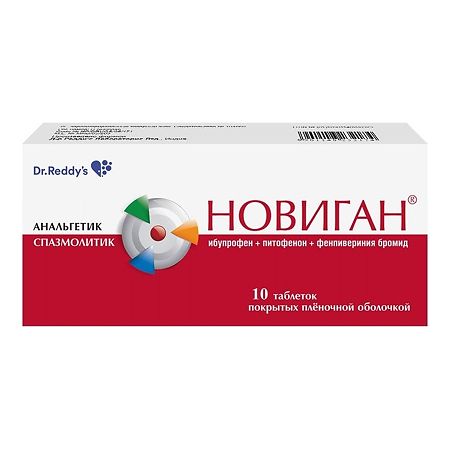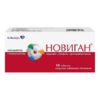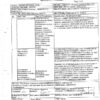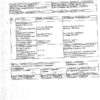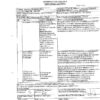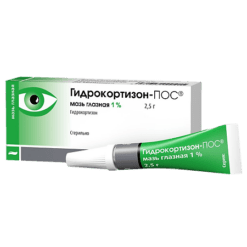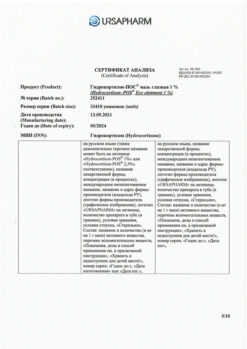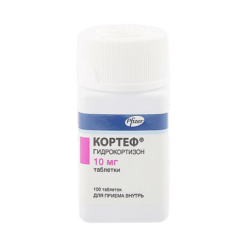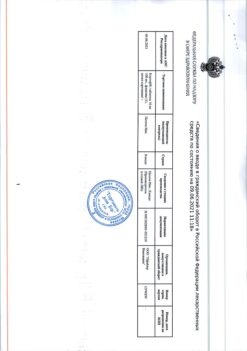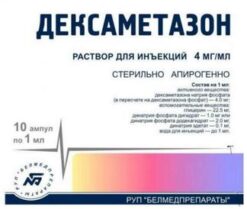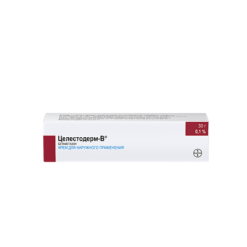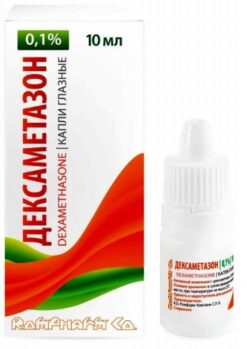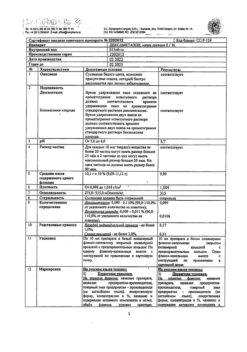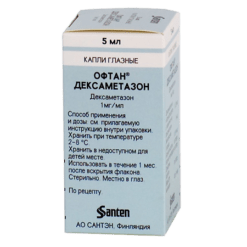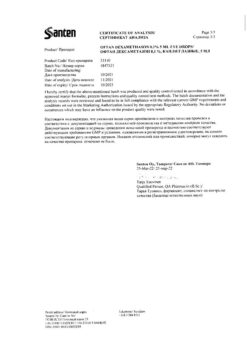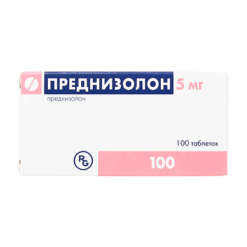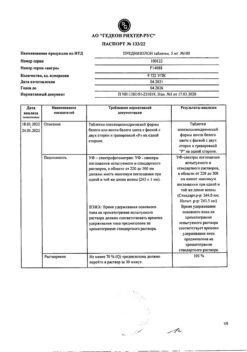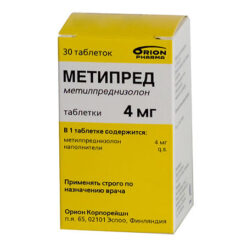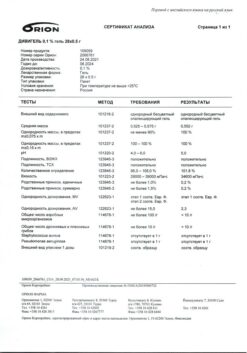No products in the cart.
Novigan, 10 pcs.
€6.11 €5.35
Description
Pharmacodynamics
Combination drug, has analgesic, anti-inflammatory and antispasmodic effects. Inhibits the synthesis of prostaglandins (Pg). The drug contains a non-steroidal anti-inflammatory agent – ibuprofen, myotropic antispasmodic agent – pitofenone hydrochloride and m-cholin-blocking agent of central and peripheral action – phenpiveryinia bromide.
Indications
Indications
Mild or moderate pain syndrome due to spasms of smooth muscles of internal organs: renal and biliary colic, biliary dyskinesia, intestinal colic.
Gynecological diseases: dysmenorrhea.
Headache, including migraine type.
Short-term symptomatic treatment for joint pain, neuralgia, sciatica, myalgia.
Pharmacological effect
Pharmacological effect
Pharmacodynamics
The combined drug has analgesic, anti-inflammatory and antispasmodic effects. Suppresses the synthesis of prostaglandins (Pg). The drug contains a non-steroidal anti-inflammatory drug – ibuprofen, a myotropic antispasmodic drug – pitofenone hydrochloride and an m-anticholinergic drug of central and peripheral action – fenpiverinium bromide.
Special instructions
Special instructions
With long-term use, monitoring of the peripheral blood picture and the functional state of the liver and kidneys is necessary.
To reduce the risk of developing adverse events from the gastrointestinal tract, the minimum effective dose should be used. When symptoms of gastropathy appear, careful monitoring is indicated, including esophagogastroduodenoscopy, a blood test with determination of hemoglobin and hematocrit, and a stool test for occult blood.
If it is necessary to determine 17-ketosteroids, the drug should be discontinued 48 hours before the study.
During treatment you should refrain from drinking alcohol.
During the treatment period, the patient should refrain from engaging in potentially hazardous activities that require increased concentration and speed of psychomotor reactions.
Active ingredient
Active ingredient
Ibuprofen, Pitophenone, Fenpiverinium bromide
Composition
Composition
Each film-coated tablet contains:
Contraindications
Contraindications
Hypersensitivity to any of the ingredients included in the drug; erosive and ulcerative changes in the mucous membrane of the stomach or duodenum, active gastrointestinal bleeding; inflammatory bowel diseases in the acute phase, including ulcerative colitis; anamnestic data on an attack of bronchial obstruction, rhinitis, urticaria, after taking acetylsalicylic acid or another non-steroidal anti-inflammatory drug – NSAID (complete or incomplete acetylsalicylic acid intolerance syndrome – rhinosinusitis, urticaria, polyps of the nasal mucosa, bronchial asthma); liver failure or active liver disease; renal failure (creatinine clearance less than 30 ml/min.), progressive kidney disease; confirmed hyperkalemia; hemophilia and other bleeding disorders (including hypocoagulation), hemorrhagic diathesis; period after coronary artery bypass surgery; acute “intermittent” porphyria; granulocytopenia; hematopoietic disorders; deficiency of glucose-6-phosphate dehydrogenase; tachyarrhythmia; angle-closure glaucoma; optic nerve diseases; prostatic hyperplasia; intestinal obstruction; pregnancy and breastfeeding, age up to 16 years.
With caution:
Older age, congestive heart failure, cerebrovascular disease, arterial hypertension, coronary heart disease, dyslipidemia/hyperlipidemia, diabetes mellitus, peripheral arterial disease, nephrotic syndrome, creatinine clearance less than 30-60 ml/min, hyperbilirubinemia, gastric and duodenal ulcer (history), Helicobacter pylori infection, gastritis, enteritis, colitis, long-term use of NSAIDs, blood diseases of unknown etiology (leukopenia, anemia), smoking, frequent alcohol consumption (alcoholism), severe somatic diseases, concomitant therapy with the following drugs: anticoagulants (for example, warfarin), antiplatelet agents (for example, acetylsalicylic acid, clopidogrel), oral glucocorticosteroids (for example, prednisolone), selective serotonin reuptake inhibitors (eg, citalopram, fluoxetine, paroxetine, sertraline).
Side Effects
Side Effects
In recommended doses, Novigan® does not cause side effects.
From the gastrointestinal tract: NSAID gastropathy (abdominal pain, nausea, vomiting, heartburn, loss of appetite, diarrhea, flatulence, constipation; ulceration of the mucous membrane of the gastrointestinal tract, which in some cases are complicated by perforation and bleeding; irritation or dryness of the oral mucosa, pain in the mouth, ulceration of the gum mucosa, aphthous stomatitis, pancreatitis.
Interaction
Interaction
At therapeutic doses, Novigan® does not interact significantly with commonly used drugs.
Inducers of microsomal oxidation enzymes in the liver (phenytoin, ethanol, barbiturates, flumecinol, rifampicin, phenylbutazone, tricyclic antidepressants) increase the production of hydroxylated active metabolites, increasing the risk of developing severe intoxications.
Microsomal oxidation inhibitors reduce the risk of hepatotoxicity.
Reduces the hypotensive activity of vasodilators and the natriuretic effect of furosemide and hydrochlorothiazide.
Reduces the effectiveness of uricosuric drugs.
Strengthens the effect of indirect anticoagulants, antiplatelet agents, fibrinolytics (which increases the risk of bleeding).
Increases the side effects of mineralocorticosteroids, corticosteroids (increases the risk of gastrointestinal bleeding), estrogens, ethanol; enhances the hypoglycemic effect of sulfonylurea derivatives.
Antacids and cholestyramine reduce the absorption of ibuprofen.
Increases the blood concentration of digoxin, lithium and methotrexate.
Enhances the effect of m-anticholinergics, H1-histamine receptor blockers, butyrophenones, phenothiazines, amantadine and quinidine.
Concomitant administration of other NSAIDs increases the incidence of side effects.
Caffeine enhances the analgesic (pain-relieving) effect.
When administered simultaneously, it reduces the anti-inflammatory and antiplatelet effect of acetylsalicylic acid (an increase in the incidence of acute coronary insufficiency in patients receiving small doses of acetylsalicylic acid as an antiplatelet agent is possible after starting to take Novigan®).
Cefamandole, cefoperazone, cefotetan, valproic acid, plicamycin increase the incidence of hypoprothrombinemia when administered simultaneously.
Myelotoxic drugs enhance the manifestations of hematotoxicity of the drug.
Cyclosporine and gold preparations enhance the effect of ibuprofen on the synthesis of PG in the kidneys, which is manifested by increased nephrotoxicity. Ibuprofen increases the plasma concentration of cyclosporine and the likelihood of developing its hepatotoxic effects.
Drugs that block tubular secretion reduce excretion and increase plasma concentrations of ibuprofen.
Overdose
Overdose
Symptoms: abdominal pain, nausea, vomiting, lethargy, drowsiness, depression, headache, tinnitus, metabolic acidosis, coma, acute renal failure, decreased blood pressure, bradycardia, tachycardia, atrial fibrillation, respiratory arrest.
Treatment: gastric lavage (only within an hour after administration), administration of activated charcoal, alkaline drinking, forced diuresis, symptomatic therapy (correction of acid-base status, blood pressure). There is no specific antidote for the drug.
Do not exceed recommended doses. If the recommended doses are exceeded, you should immediately consult a doctor or the nearest medical facility (bring the drug package with you).
Storage conditions
Storage conditions
At a temperature not higher than 25 C.
Keep out of the reach of children!
Shelf life
Shelf life
5 years.
Manufacturer
Manufacturer
Dr. Reddy’s Laboratories Ltd, India
Additional information
| Shelf life | 5 years. |
|---|---|
| Conditions of storage | At a temperature not exceeding 25 C. Keep out of reach of children! |
| Manufacturer | Dr. Reddy's, India |
| Medication form | pills |
| Brand | Dr. Reddy's |
Related products
Buy Novigan, 10 pcs. with delivery to USA, UK, Europe and over 120 other countries.

